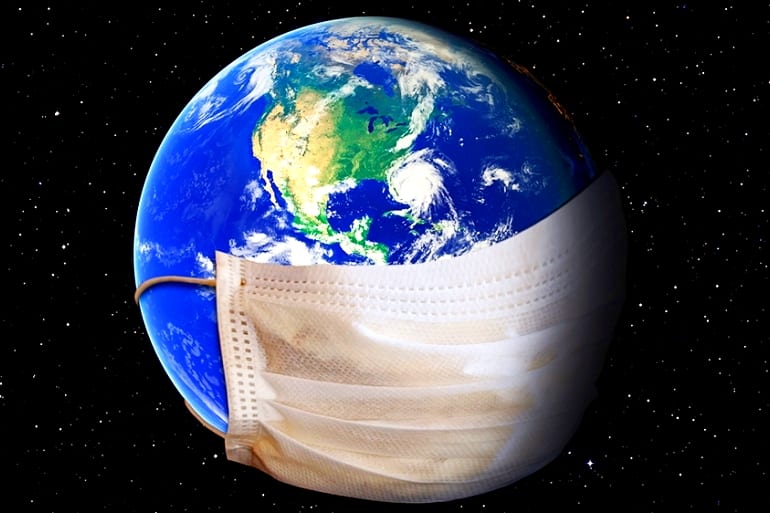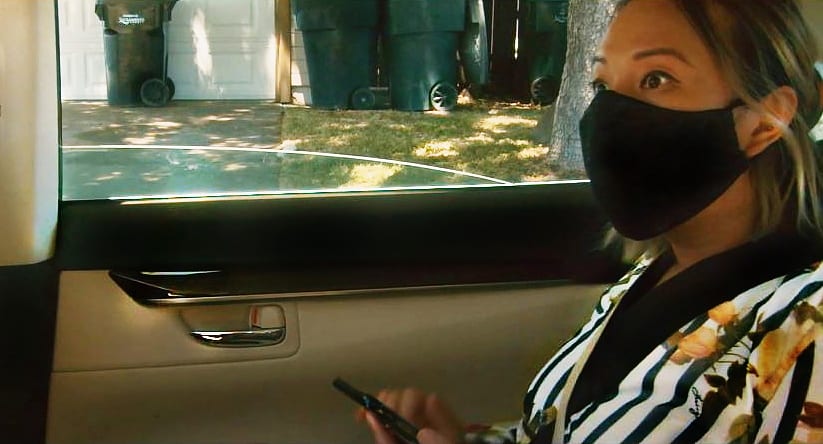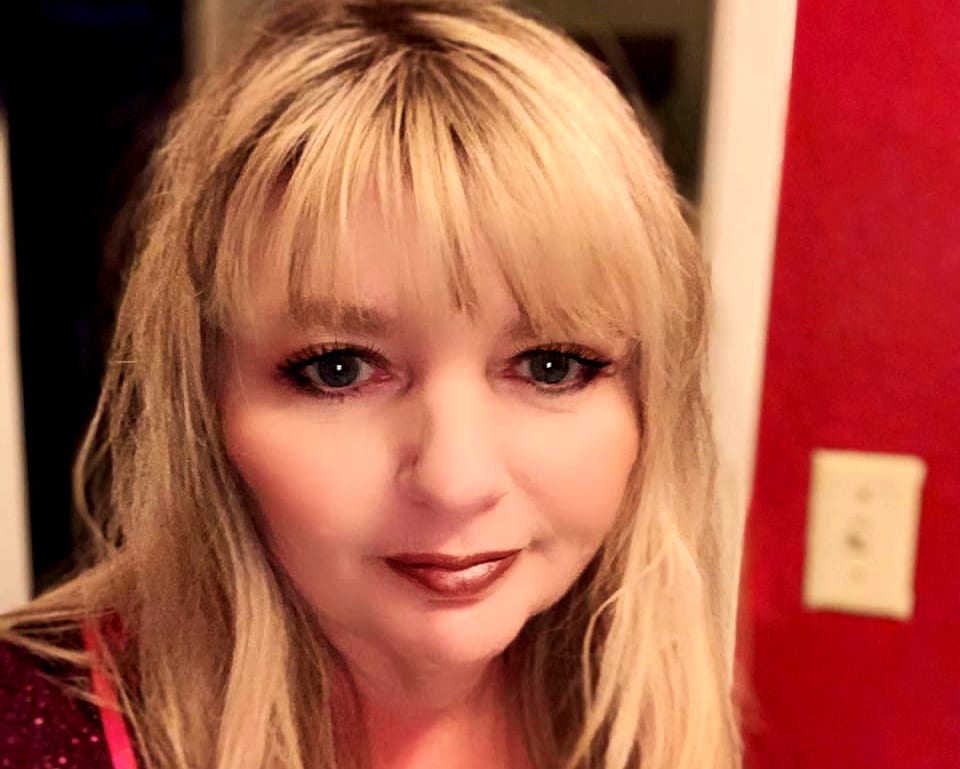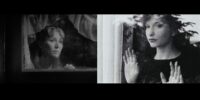Shawnda Christiansen’s directorial debut, Six Feet of Separation looks back at March 2020 as the COVID-19 pandemic spread all over the globe. In it we hear from people affected in India, Italy, the United States, Greece, and Brazil as society grappled with the loneliness of quarantine.
Christiansen is a Californian writer and producer whose credits include the series Junkie, The Slayer Chronicles, and the book series Miles To Go. Her film Six Feet of Separation is narrated by Dee Wallace (E.T. The Extra-Terrestrial, Cujo, The Howling), Kevin Sorbo (Hercules: The Legendary Journeys, Andromeda) and features actress and radio host Arlene Barshinger. The documentary recently received a nomination for Best Documentary at the 2020 British Film Festival. Christiansen talks to us about her background, challenges in getting the film completed during lockdown and why one of of the most iconic horror movies of all time inspires her work.
Jason: Can you begin by telling us how you got involved with film making?
Shawnda Christiansen: For a long time I worked in the substance abuse field. Often, we thought that it’d be great to tell a story about the day-to-day life in a residential treatment center, but I didn’t really know where to begin. Some time later, I ended up as an associate producer on another film set, and I met actor Tim Russ who played Lt. Tuvok on Star Trek: Voyager, and Principal Franklin on iCarly. He’s been working in Hollywood for a very long time. Watching him work, I had a moment where I knew it was time for me to do that. So I went to him with my idea, which was about a rock bottom junkie who trades a needle for a gun and finds herself in an explosive conflict with the local cartel. From there, we worked out the screenplay, and Junkie was my first movie back in 2018. And I released a couple of books. So the first book Miles To Go is the true story that inspired Junkie. And then there’s Firefly, which is a sequel to Junkie, which someday we’re hoping to make. That got everything rolling for me in the film industry .
Jason: That first experience making Junkie, what did that teach you about telling stories on film?
Shawnda Christiansen: Well, it taught me that there’s a lot to it. There’s a science to telling a good story, you can’t just go out and film and throw together an hour and a half worth of movie for people to watch, there has to be an actual story to keep the audience engaged. So, I learned about the importance of an outline or a beat sheet. Every good film follows a certain sequence of events; they’ve always got your protagonist and your antagonist. And the protagonist has to have a goal—some place that they’re supposed to get to, and the antagonists job is to keep them from getting there.
Jason: I’d like to ask you about your documentary Six Feet of Separation. Did you film this during the pandemic last year? How were your interviews conducted?
Shawnda Christiansen: Yes, we filmed the documentary during quarantine. We conducted the interviews via Zoom. Video chat was the only thing that we could do. We also have reenactments which we could coordinate by keeping it outside and by having one or two people working at a time. And that was after they lifted the quarantine and things were partially opening back up. So that was an interesting way to spend time during quarantine.
Jason: You spoke to people from other countries in the film. Why did you want to make it global?
Shawnda Christiansen: We were seeing on the news the unbelievably high death tolls in Italy which kept rising. And we were curious what it was like to be in Italy, and wanting to verify that the news was real. Part of the documentary is because there were so many people questioning whether it was a real pandemic, or if it was fake news, or if it was a government conspiracy. When we saw the rising death tolls in Italy, my friend and co-host, Arlene Barshinger knew some people there and when we talked to them, they were actually at the height of the pandemic. From there it just spread so each person we talked to in another country knew people in yet another country, and we just kept making the rounds. It seems like with each country we talked to; we were catching them right when they were in the middle of their worst with the pandemic and their lockdowns. In Italy, one reason the death tolls were so high is because their ICUs were overflowing, so they actually had to decide who to treat and who not to treat based on their life expectancy. They would turn a lot of elderly people away in order to treat somebody that was over 50. So that was pretty harsh. It was interesting to find out what it was like in other countries, and then we just kept going to the US and India.

Jason: Most documentaries are about events which have already happened. What was it like making one that was so in the moment, one where the next day or week or month nobody could predict what might happen?
Shawnda Christiansen: It was nice from a human resource aspect or a sociology aspect to connect with other people going through something similar. There were a lot of developments I would have loved to have covered in the documentary, including immunizations. We’re going to film a sequel so we can cover the rest of what has happened during the pandemic. The documentary covered 30 days of the pandemic in quarantine.
Jason: Was it unusual to be making a documentary you were actually a part of the events, where you were going through the same thing as everyone else instead of just asking somebody about their experience?
Shawnda Christiansen: It was different and stressful and during our documentary, the George Floyd incident happened and that led to civil unrest and the riots. I was going to use a lot more coverage of that in the documentary, but there’s still a little in it. Then there were the back to work protests, so I had to make the tough decision of whether I should go out there and film that. It’s significant information to have in the documentary, but it can also be dangerous to be out there in the middle of. I would say it was a rewarding experience to talk to other people about something that I was going through because it gave me a chance to grow out of myself. But there were also some days when it was exhausting. I would have to say that some days, it affected me differently than others.
Jason: When you’re working on a project where every day, there are fresh developments, was it exciting to not know what you might be preserving or capturing on film?
Shawnda Christiansen: I think it was a motivating factor to just keep pushing forward. Each day there would be something that could get stressful. There’s only so many minutes that can be in the documentary and I actually have 20 or 30 hours worth of interviews, but the documentary is only an hour and a half. So it was difficult to decide what to cover and what not to cover. There’s a lot of information for the follow up documentary. There will be a second and a third one that I already have interviews for.

Jason: Can you give me one example that was common among the people you’ve spoken to in other countries and something that was that different?
Shawnda Christiansen: Well, in other countries many believed that it was the end of the world. They believed that we were in the end times but in the United States I don’t recall any of the people believing that. The people in the other countries believed that we’re experiencing the events in the Book of Revelations. In the United States, we didn’t talk to anybody that felt so strongly in that way. So the other thing is in the other countries, they believe that you had to follow quarantine guidelines and you have to wear a mask, because if not, it will be the end of the world. In the United States, there’s a lot more pessimistic people that weren’t so sure that we needed to wear a mask. So I would say that the number one thing that divided people is whether the government was overreaching, in shutting down the economy but in other countries, they weren’t questioning that at all. Everybody that we spoke to in foreign countries believed that the shutdown was a necessity to save the world.
Jason: Can you tell me a bit about how you got Dee Wallace and Kevin Sorbo to come aboard as narrators?
Shawnda Christiansen: We interviewed them and then we brought them on as narrator’s. With Dee, she felt it was really important to be a part of it because she works as a healer besides being an actress, so she’s very spiritual. She felt it was important to share her healing message with everybody who watches this documentary. And she feels that 2020 was all about adapting so the message she brought to the table is that we need to learn to adapt. Her favourite saying is ‘shit happens and there’s nothing that we can do about it except, do our best.’ One day It’s time to adapt to change whether we like it and it’s our decision to decide what we’re going to do about that change. So we can either sit around being upset and ruining our lives over it, or we can try to adapt and get through it.
Jason: And I understand Kevin provides a completely different counter-point and that his views represent another group of people mainly within the United States.
Shawnda Christiansen Kevin Sorbo brought us a completely opposite aspect, because Kevin believes that it’s all overreaching. He believes that the virus is real, but he does not agree with everybody hiding out until it goes away, because it’s a part of our lives. He doesn’t believe in wearing masks everywhere or shutting down the economy. He thinks everybody should continue on as they were. And that people that are of higher risk could protect themselves by sheltering in place. It’s ridiculous to him they closed down the parks and the churches and the schools.
Jason: He’s been very vocal about this of course on Twitter and has received his share of attacks while those that do probably forget that his views are just as valid as anybody else’s and I believe you can still always learn something from others with opposing viewpoints.
Shawnda Christiansen: And he makes good points in the documentary. He shared a story about a church who decided they were going to do outdoor services. All you had to do is pull up in your car and roll down your window, and then you could listen to the sermon over the speakers. And he said that the local police actually went out and wrote citations to the people parked there listening to the sermons. And I agree with him that is an overreach, there’s absolutely no reason for that. They’re not out interacting with people, there’s no way that they can spread the virus.
Jason: Why it was important to hear both sides of a political spectrum, if you want to call it political?
Shawnda Christiansen: It was important to hear both sides because I appreciate a documentary that documents where it happens rather than trying to mold or force an opinion. A documentary should be like a history book. What was really happening during the pandemic? And that’s what I was hoping to deliver with as it details people’s personal experiences as they’re going through quarantine. And it doesn’t guide the viewer into any opinion about either. The number one thing I hear from people is that they love how it explores both sides. Some people get angry about Kevin Sorbo and what he says and other people love what Kevin says so regardless of how you feel about the situation, you get something out of the documentary which is what I was hoping to achieve.
Jason: Oh, absolutely. Was there a story you heard during your interviews, or a conversation which surprised you the most?
Shawnda Christiansen: Probably what Kevin was saying about the church service people in their cars. Those kinds of stories really stood out to me the most because I was asking myself ‘what world are we living in right now?’ There were some really extreme things going on around the world. I read a letter from a judge where he wrote people couldn’t go get chemotherapy because this service wasn’t considered essential anymore. I think local governments, surprised by what happened, put little thought into the restrictions. And so it seems like a lot of local governments horribly mishandled the whole thing. That’s the thing I learned the most in the documentary that just completely baffled me with the mandate,that a woman with breast cancer couldn’t go to her follow-up visit but medical marijuana clinics were still open. If you sit and look at the things that were essential and non-essential, it didn’t really make sense for a while there.
Jason: You also take a look at how COVID affected workers in the health care profession. Can you talk a little about Maggie Theonnes, the New York City ICU nurse featured in the documentary?
Shawnda Christiansen: She was amazing. She works in an actual ICU with COVID patients. What she was explaining is that people come in there and one minute they’re fine, people in their 30’s or 40’s and then go home and come back the next day and they’re on life support. She said that how the virus is affecting the body causes massive blood clotting so patients will come in one day, and the next day, they’re dying. Maggie was under a lot of stress and was dumbfounded by all the people giving a hard time about wearing a mask. So a big message in the documentary is to please wear a mask because they don’t want anybody else to get it either. She said that she’s never seen people so sick in all of her years of nursing. It’s a nasty virus, especially from the front-lines.

Jason: I’m writing this interview for a site which primarily writes about movies so this is a more lighter question: Is it true that the original Halloween is your favorite movie?
Shawnda Christiansen: Well, I’ve always loved that movie and just this last Halloween, I watched it again. And I think that what I love the most about it is its simplicity. Throughout the movie, most of the scares is of Michael Myers standing in the shadows somewhere and he’s not even doing anything. It’s just about the music and that he’s lurking in the shadows. It launched the entire genre, because they ended up coming up with Friday the 13th and a bunch of other movies after that. It’s so simple yet effective at the same time. I hope someday to make a horror movie that is simple like that. I’m in production right now on a horror movie called Into the Further and I got that idea because of my documentary. I thought it would interesting If you take a group of people — a group of ghost hunters who haven’t been out on investigation because they’ve been in quarantine and take them to a really haunted location. It takes place in a Post COVID world. So we’re filming that right now and I’ve been keeping Halloween in the back of my mind with the story in terms of the scares. So I’m hoping that it turns out as scary as that.
Jason: I think the horror you’re working on will more likely be along those lines, but with a lot of insight given your background and everything you’ve learned as a counselor and just from this year. Can you tell me about what the reaction has been to people who’ve seen your documentary?
Shawnda Christiansen: Well, so far, they just really appreciate that it explores both sides of the pandemic. People who believe in wearing masks and shutting down the economy disagree passionately with Kevin Sorbo and people who agree with wearing masks and locking down agree passionately with everybody else in the film. Kevin is the only person in the film that doesn’t agree with the shutdowns so that’s one thing that I get from it. Many people are recommending it because they got something positive out of it and right there, that makes me happy. It means that I achieved the goal.
Jason: So what would you like people to take away with them after they’ve seen Six Feet of Separation.
Shawnda Christiansen: Hopefully, we’ll have a more open mind that there are two sides to this argument. And that even though safety is important and we all want to bring an end to this pandemic, we don’t need to attack somebody for having a different opinion. Nobody really knows what’s going on with this pandemic. Nobody really knows if shutting down the economy was necessary. In Sweden, I’m pretty sure they took a different route and their outcome was the same. Everybody has their opinions, and everybody’s opinion is valid, and we all need to come together as a population and support each other. That’s what I’m hoping people get from the documentary.
Jason: I believe you already touched on this is future projects and what you’ve got coming up?
Shawnda Christiansen: Well, I’ve got a vampire movie, actually called The Slayer Chronicles – Volume 1 that’s completed. We’re just waiting for the last work on post production. Then I’ve actually just finished the first book for The Slayer Chronicles, which is available for pre-order now, but it will not be available for at least another two months. Right now I’m in production on Into the Further, the horror film that I wrote, where a group of paranormal enthusiasts venture out into a post apocalyptic COVID world.
Jason: Good luck on those projects and with Six Feet of Separation
Shawnda Christiansen: Thank you so much.
Six Feet of Separation is available on DVD on Amazon. Visit www.megareelentertainment.com for all announcements on additional ways to watch the documentary, as it continues to be released in more places.


